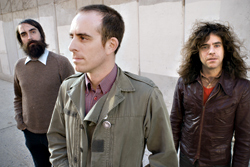Ted Leo and the Pharmacists’ fifth studio record, Living With the Living, opens with a 45-second, static-flecked flurry of what sounds like military radio communications, or possibly snippets of cable-news war coverage. It’s a familiar device for overtly political artists, but it’s sonically underlined by a more effective ambiguity—the muddling of gunfire with striking rumbles of percussion. Such heavy-handed foreshadowing would be tiresome if it weren’t followed by 15 brutally beautiful tracks of combat rock that are as structurally adventurous as they are politically galvanizing.
There are unabashed, well-chosen nods to Leo’s influences, such as the riff on the Kinks’ “Victoria” that opens “Army Bound” and the Elvis Costello–tinged lyrical flourishes that inform “Colleen.” Expansions upon Leo’s previously exhibited strengths are evident, particularly the innate gift he showed for undeniably invigorating choruses when he fronted beloved mod-punk outfit Chisel in the mid-’90s. And anyone dissastisfied with Leo’s relatively meager crop of unapologetic anti-Bush screeds thus far will be pleased with the record’s first single and video, “Bomb. Repeat. Bomb.” Political invectives aside, a great deal of the record’s cohesion is in debt to his meticulous editing process, which he doesn’t hesitate to elaborate upon when I contact him in the midst of the whirlwind press blitz he’s currently undergoing.
“Well, the editing process is different depending on what the intent of the song [is],” Leo says. “A song like ‘Colleen’ is meant to reside somewhat specifically within a traditional pop song structure…[but] it sometimes takes a certain extra bit of work to tighten a song like that up to a concise point that you feel gives the maximum delivery to the idea.
“A song like ‘The Lost Brigade,'” he says, referring to the prog-motivated boogie of the record’s most unpredictable track, “is obviously meant to take a completely different path. I was kind of interested in grafting a somewhat tight pop structure onto a more open-ended, almost trancey piece, and the whole first part of the song, which could theoretically have existed on its own, is given a different context and not meant to deliver the same kind of immediate bang. It’s meant to be understood only along with the big, long ending, so the editing of the front end takes on a different series of priorities.”
Indeed, Leo occasionally sounds as geekily scientific as the moniker of his backing band implies, carefully dosing out milligrams of addictive hooks but monitoring the prescription with the vigilance of a doctor holding a degree from the Graduate School of Cerebral Pop-Punk. But hell, at a time when contrived ennui remains mysteriously in vogue, and flavor-of-the-moment bands garner breathless accolades that are often forgotten almost as soon as they are exhaled (Tapes and Tapes, anyone?), such detail-obsessed craft work is probably exactly what the thinking punk needs.
Somehow, this precise, laborious technique is impressively weaved into its foundation and doesn’t undermine the urgency of his anti-war message or the energy of the performances that producer and longtime friend Brendan Canty has committed to tape. “Ted, [bassist] Dave [Lerner], and [drummer] Chris [Wilson] would have a bitch of a time making a record that didn’t include that energy,” affirms Canty. “They exude power, and the whole thing happens very quickly. They are now five years into being a super-tight touring machine, and one has to be listening hard and fast to make calls on [which] performances to keep.”
Speaking with both of them separately, it’s obvious that Canty and Leo have boundless respect and affection for each other—not to mention much in common. “I think the ability to access memory of obscure punk-single B-sides is my most compelling attribute,” says Canty, half-joking. “I would hear a guitar sound and say, ‘I love it! It’s almost like that Scars single, “Horrorshow!”‘ And [Leo’s] eyes would light up. I do not share his affinity for Celtic death metal, though.”
“First of all, I love him dearly as a friend, so the level of comfort and unself-consciousness that we can have in the studio is priceless,” says Leo. “I think we have not only a lot of the same reference points but also a lot of the same tastes. Brendan is a great engineer in almost any context that you might want him to be—that is, he can do hi-fi, but he can also give you ideas and experiments that go far beyond the basics.”
While it’s certainly a strong step away from anything basic, Living With the Living is also grounded in the principles of progressive punk politics, and it’s impossible to ignore the way in which the loss of one of our most articulate punk activists hovers over the record. This is particularly true during the closing track, when Leo indicts both apathetic objectors and guilty instigators with the objective but insistent refrain “Only you know what you’ve done.”
So what did Ted Leo do the day Joe Strummer left this mortal coil?
“The day Joe Strummer died, I went out to breakfast with my [now] wife, she cried, and I thought about it a lot. And I wrote about it a lot. He was a constant presence that reminded me what music could aspire to be. And actually, he remains so.”








